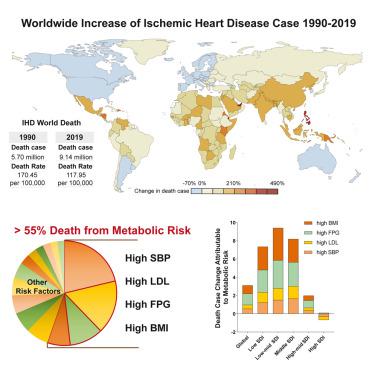Cell Metabolism ( IF 27.7 ) Pub Date : 2021-09-02 , DOI: 10.1016/j.cmet.2021.08.005 Wenxin Wang 1 , Manli Hu 2 , Hui Liu 3 , Xingyuan Zhang 4 , Haomiao Li 1 , Feng Zhou 2 , Ye-Mao Liu 1 , Fang Lei 4 , Juan-Juan Qin 1 , Yan-Ci Zhao 1 , Ze Chen 5 , Weifang Liu 4 , Xiaohui Song 1 , Xuewei Huang 1 , Lihua Zhu 1 , Yan-Xiao Ji 6 , Peng Zhang 4 , Xiao-Jing Zhang 4 , Zhi-Gang She 1 , Juan Yang 1 , Hailong Yang 1 , Jingjing Cai 7 , Hongliang Li 8

|
Metabolic dysfunction is becoming a predominant risk for the development of many comorbidities. Ischemic heart disease (IHD) still imposes the highest disease burden among all cardiovascular diseases worldwide. However, the contributions of metabolic risk factors to IHD over time have not been fully characterized. Here, we analyzed the global disease burden of IHD and 15 associated general risk factors from 1990 to 2019 by applying the methodology framework of the Global Burden of Disease Study. We found that the global death cases due to IHD increased steadily during that time frame, while the mortality rate gradually declined. Notably, metabolic risk factors have become the leading driver of IHD, which also largely contributed to the majority of IHD-related deaths shifting from developed countries to developing countries. These findings suggest an urgent need to implement effective measures to control metabolic risk factors to prevent further increases in IHD-related deaths.











































 京公网安备 11010802027423号
京公网安备 11010802027423号